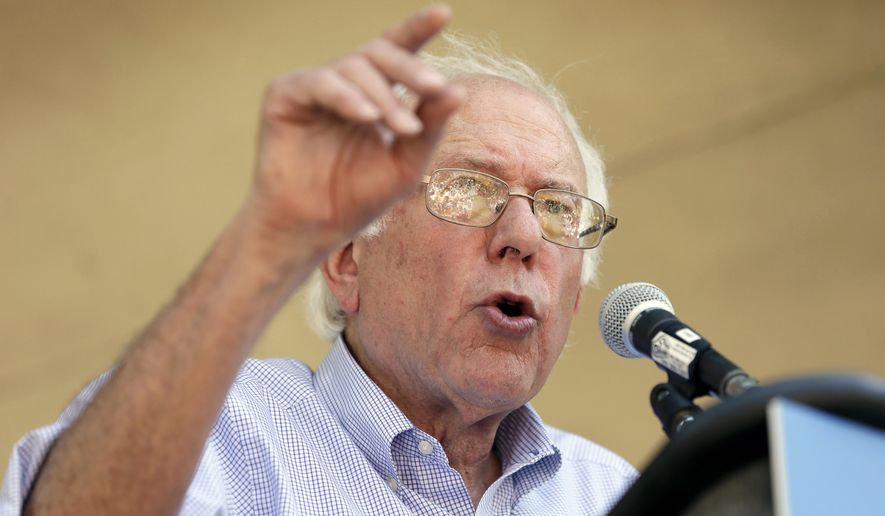Democratic presidential contender Sen. Bernard Sanders on Monday sought to make inroads with conservative voters with a speech at Liberty University, telling students at the Christian-based college that they should be able to find common ground on his economic justice agenda.
“Let me be very frank: I understand that issues such as abortion and gay marriage are very important to you and that we disagree on those issues. I get that,” Mr. Sanders said. “But let me respectfully suggest that there are other issues out there that are of enormous consequence to our country and the world and that maybe, just maybe, we don’t disagree on them.
“And maybe, just maybe, we can work together in trying to resolve them,” continued Mr. Sanders, a Vermont independent and avowed socialist.
Mr. Sanders’ outreach to conservative voters came amid his surge in the polls, taking the lead from Hillary Rodham Clinton in the early-voting states of Iowa and New Hampshire. His speech at Liberty University began to beat back at the widespread perception among the Democratic Party establishment that his far-left agenda makes him unelectable in the general election.
Mr. Sanders made his pitch for political cooperation on the same campus in Lynchburg, Virginia, where Sen. Ted Cruz of Texas announced his candidacy as a Republican for president.
Founded by the late Rev. Jerry Falwell Sr. in 1971, Liberty University reigns as the largest evangelical Christian university in the world.
“I came here today because I believe that it is important for those with different views in our country to engage in civil discourse — not just to shout at each other or make fun of each other,” said Mr. Sanders, who is Jewish.
Mr. Sanders insisted that people of faith should join him in combating economic injustice, which has been the overarching theme of his run.
“It would, I think, be hard for anyone in this room to make the case that the United States today is a just society or anything close to a just society. In America today, there is massive injustice in terms of income and wealth inequality. Injustice is rampant,” he says.
His calls for economic justice were met by cheers and applause from the audience, which responded to the same applause lines as do the crowds at a typical Sanders campaign rally.
Halfway across the country in Iowa, Mrs. Clinton followed Mr. Sanders with her own call for finding “common ground” with Republicans.
“I will go anywhere anytime to speak to anybody about trying to find that common ground. I think that is what you are supposed to do in a democracy,” Mrs. Clinton told a group of women voters at the University of Northern Iowa.
She stressed that she had experience working across the aisle as first lady, senator and secretary of state, a resume she hopes will distinguish her from Mr. Sanders.
“I’ve done the work. I know how hard it is. If we could snap our fingers and make the changes we think are best for America, we’d snap like crazy,” said Mrs. Clinton. “This is hard work. It takes intense effort to find common ground, to build those relationships. I did it when I was in the White House, when I was in the Senate and as secretary of state.”
The meat of Mr. Sanders’ address in Virginia was the same as his standard stump speech, in which he rails about the concentration of wealth among the top one-tenth of 1 percent of Americans and the proliferation of millionaires and billionaires while the United States has the highest rate of childhood poverty in the industrialized world.
Mr. Sanders told the students that he applauds the university’s goals of trying to “understand the meaning of morality and the words of the Bible within the context of a very complicated modern world.”
He described his political vision as one that is based on religious principles.
“I am far, far from a perfect human being, but I am motivated by a vision which exists in all of the great religions — Christianity, Judaism, Islam, Buddhism and others — and which is so beautifully and clearly stated in Matthew 7:12: ’So in everything, do to others what you would have them to do to you, for this sums up the Law and the prophets,’ ” he said. “The Golden Rule. Do to others what you would have them do to you. Not very complicated.”
• S.A. Miller can be reached at smiller@washingtontimes.com.




Please read our comment policy before commenting.